It was plenty hot at 9 a.m. on a summer Saturday morning when Lashunda Collins, a first-year dental student at Meharry Medical College, suited up in full personal protective equipment —mask, face shield, hair covering, gloves and a long blue paper gown.
She was one of about 15 student volunteers regularly getting up early on one of their rare free days to administer COVID-19 tests to people. Those getting tested often need a lot of reassurance along with the free, if somewhat unpleasant, nasal swabs.
Meharry has been partnering with African American churches on Saturdays, starting as early as 7 a.m. and working until the last person has been served. On this July day, cars lined up outside St. Luke Christian Methodist Episcopal Church.
Laughing, Collins admitted she needed to study for finals in her medical graduate class. “But, hey, I’m here. I have been volunteering since April, probably over 10 times,” she said.
People are scared when they drive up, she explained, “I tell them to relax, it is just an uncomfortable feeling but it will be done in two minutes.”
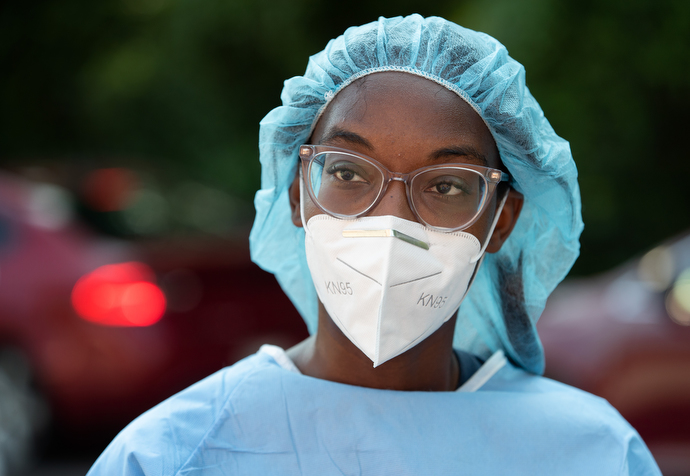
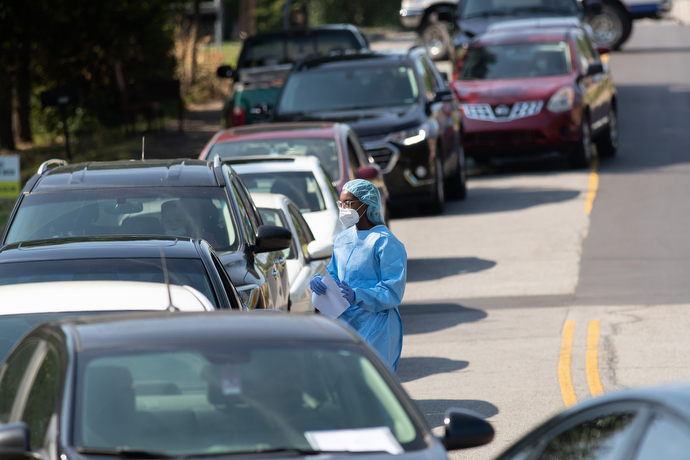
Meharry, a historically Black medical school supported by The Black College Fund of The United Methodist Church, is doing all the free COVID-19 testing for the city of Nashville, where the positive cases of the dangerous pandemic are raging.
Partnering with churches is a natural for the school, said Dr. Cheare Farmer-Dixon, dean of school of dentistry. She supervises the testing.
“Meharry is a faith-based school with our foundation in the church. We have for decades partnered with churches. It’s a match made in heaven,” she said. Working with churches gets the students intimately engaged with community, she added.
Testing is just one of the ways this tiny medical school is on the forefront of the fight against COVID-19.
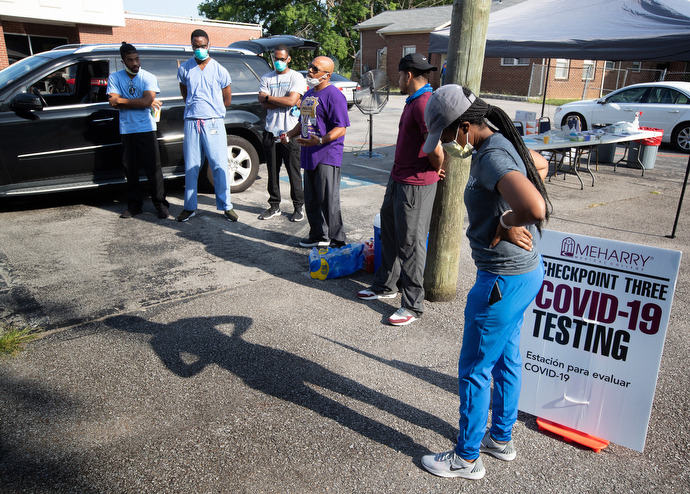
Dr. James E.K. Hildreth, president of Meharry, is on the Nashville mayor’s COVID-19 task force. COVID-19 patients are also being treated at Nashville General Hospital at Meharry.
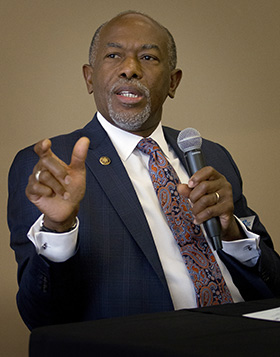
Photo courtesy of Meharry Medical College.
“We decided in March we needed to get involved to make sure the community we serve would have availability of testing,” Hildreth said. “We serve a lot of community members who don’t have insurance. They had no way to get tested.”
Hildreth said the medical school is testing 10,000 or more a week. In addition to the testing, a Meharry surgeon is working on a prototype for a new ventilator that can be produced in large numbers, Hildreth said.
“Given what has happened, the need for ventilators is not going to go away,” he said.
Donald Alcendor, associate professor of microbiology and immunology, is working on an antiviral drug that is specific for treating COVID-19.
“We have 148,000 people who have died of this infection, we have 4.3 million people who are infected, what are you going to do for people who are already infected? This is where an antiviral comes in,” Alcendor said on July 28. “It would be useful to give to a person prior to infection and after a person is infected.”
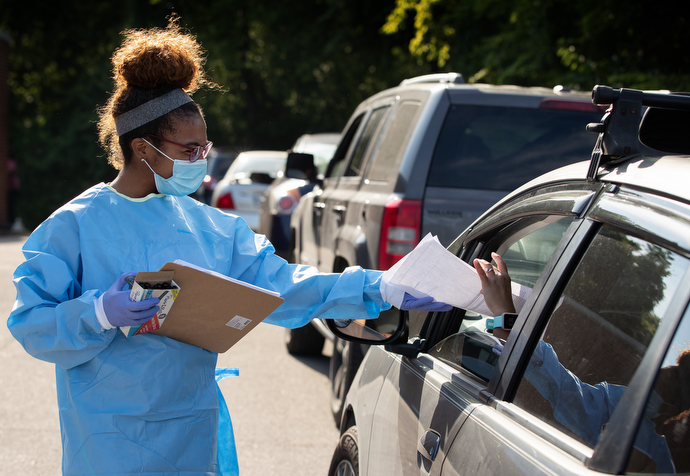
Meharry is also part of Operation Warp Speed, a collaboration between national institutes of health and pharmaceutical companies to create and test a vaccine, Hildreth said. Meharry will be one of the test sites.
“Right now we are going through stages of getting protocols approved and probably as early as the end of August we will start enrolling participants,” he said. “One of my biggest concerns is acceptance of vaccines especially among African Americans.”
He is working to engender trust among populations that will need the vaccine the most, he said.
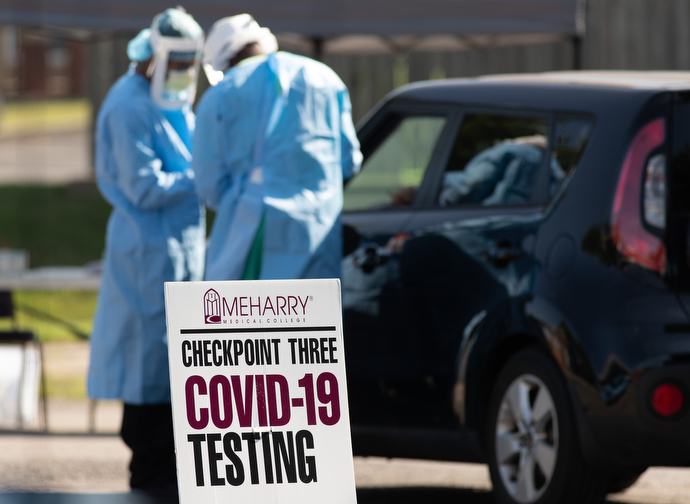
“You talk to African Americans, especially those of my generation, there is a lot of skepticism and mistrust not only of vaccines but the healthcare enterprise generally.”
Given the history of how African Americans have been used and abused in experiments over the decades, the mistrust is not surprising, he said.
“We know black and brown persons are having more trouble with this virus than anybody else because of health inequities that have long existed,” Alcendor said. “Many are living in multi-generational housing that simply will not allow social distancing.”
Personal protective equipment is not there, even in the simplest forms such as masks, he said.
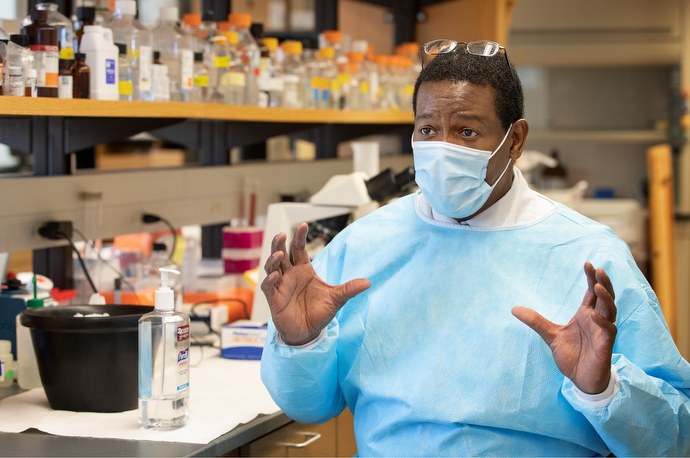
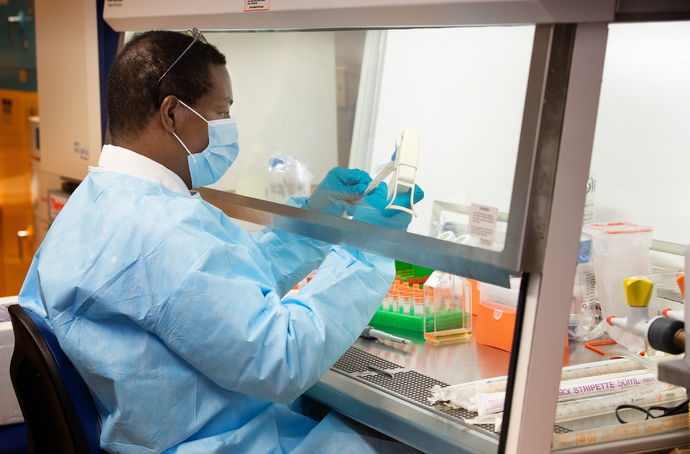
Meharry's mission and vision
In 1876, the Meharry Medical Department of Central Tennessee College admitted its first 11 students. Two faculty members, Dr. William J. Snead and Dr. George W. Hubbard, taught classes in the basement of Clark Memorial United Methodist Church. Within 10 years, Meharry added programs for nurses and dentists and distinguished itself as the medical institution for people of color.
Today, Meharry receives over 5,000 applications for admission to the M.D., D.D.S., M.S.P.H., and Ph.D. programs, with a mission of providing opportunities for people of color, individuals from disadvantaged backgrounds, and others, regardless of race or ethnicity, to receive excellent education and training in the health sciences and conduct research that fosters the elimination of health disparities.
The school is one of 11 historically Black colleges supported by the Black College Fund of The United Methodist Church.
“Where you have poverty, a disease is looking for that population. Poverty will put you in a way where you cannot get out of the way of disease,” Alcendor said.
As the rate of infections rise, so do everyone’s chances of getting the disease.
“When you have a thousand people who are just dying every day and you have 60,000 new infections every day that cannot go on. What that means if you have that many new infections is an infection is coming close to you as a person every single day. You are getting closer to being infected every single day. You have to have your guard up at all times,” he said.
Both Hildreth and Alcendor warn against schools opening for in-person classes in places where the infections are increasing.
“In communities where the virus is not under control, schools represent opportunities for what are called superspreader events,” Hildreth said, referring to gatherings that result in many infections. He points out many schools do not have the proper ventilation, especially in older buildings.
“I have to keep reminding people, these are extraordinary circumstances. No one wants any of this. I am restless, I miss being able to interact with my students and my team on a daily basis,” he said. But, until a proven vaccine has been made public, “we just have to work through this.”
“This pandemic could cut the world’s population down by a tenth. If that is not serious to anybody that is walking around then they are not alive,” Alcendor said.
Alcendor also points out the flu season is about two months away.
“The flu will come and take 30,000 to 60,000 lives every year in the U.S. You throw a coronavirus that is basically uncontrolled in the middle of a flu season you have something that is clearly unmanageable. You might even begin to see young people that have no underlying conditions that would be at risk for this virus and be at risk for the most severe disease. That is the scary part.”
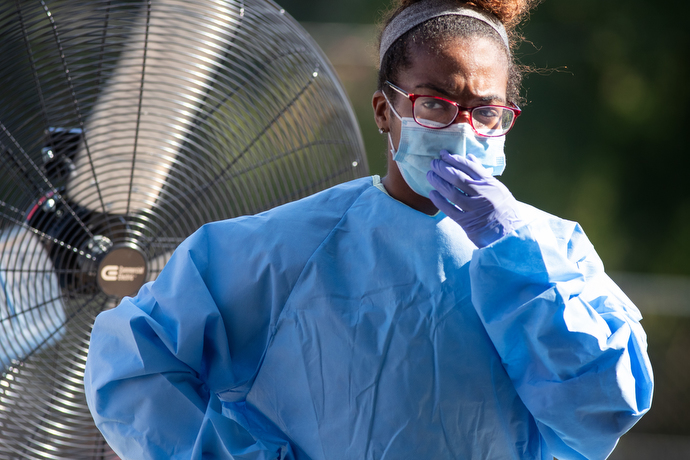
The long-term effects of COVID-19 are still unknown, Hildreth said.
“One of the things we are not talking about and that I am deeply concerned about is people who get infected and recover have long term consequences in respiratory system especially. This happened with SARS, with MERS, the other two coronavirus pandemics. And there is no reason to doubt it will happen with COVID-19 as well.”
Hildreth said Meharry alumni are on the frontlines all across the country. It is the spirit of service that sets Meharry graduates and staff apart, he said.
Collins, on the hot, blacktop pavement at St. Luke Christian Methodist Episcopal Church readily recited the Meharry creed before she started talking about anything else: “Worship of God through service to mankind.”
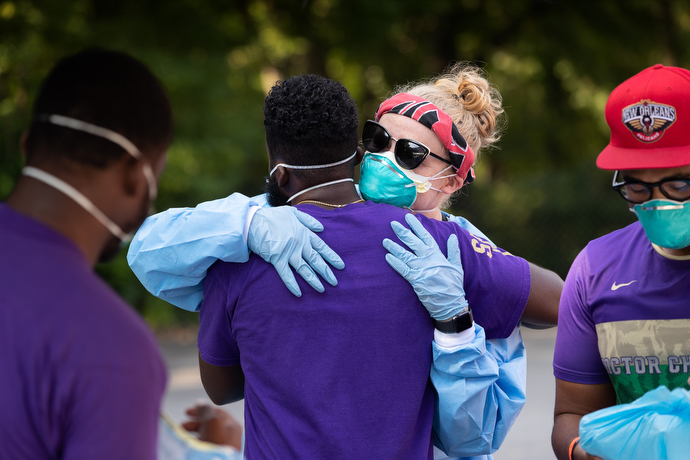
Gilbert is a news writer for United Methodist News, contact her at (615) 742-5470 or newsdesk@umnews.org. To read more United Methodist news, subscribe to the free Daily or Weekly Digests.
Like what you're reading? Support the ministry of UM News! Your support ensures the latest denominational news, dynamic stories and informative articles will continue to connect our global community. Make a tax-deductible donation at ResourceUMC.org/GiveUMCom.



